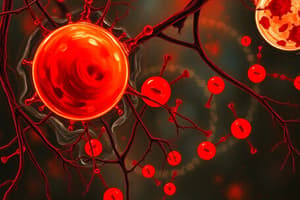Podcast
Questions and Answers
Which component of blood is primarily responsible for transporting oxygen from the lungs?
Which component of blood is primarily responsible for transporting oxygen from the lungs?
- White Blood Cells
- Plasma
- Platelets
- Hemoglobin (correct)
What is the role of antibodies in the blood?
What is the role of antibodies in the blood?
- Transporting nutrients
- Defending against infections (correct)
- Regulating body temperature
- Clotting blood
Erythropoiesis refers to the process of:
Erythropoiesis refers to the process of:
- White blood cell formation
- Platelet production
- Red blood cell formation (correct)
- Antibody synthesis
Which function of blood helps maintain appropriate body temperature?
Which function of blood helps maintain appropriate body temperature?
What triggers the secretion of erythropoietin?
What triggers the secretion of erythropoietin?
Which of the following is NOT a component of blood's function?
Which of the following is NOT a component of blood's function?
Leucopoiesis is the formation of which type of blood cells?
Leucopoiesis is the formation of which type of blood cells?
The process of blood clotting is known as:
The process of blood clotting is known as:
Which function of blood is primarily related to its role in the circulatory system?
Which function of blood is primarily related to its role in the circulatory system?
How does blood contribute to homeostasis?
How does blood contribute to homeostasis?
Which of the following is a non-cellular component of blood?
Which of the following is a non-cellular component of blood?
What initiates the process of hemostasis?
What initiates the process of hemostasis?
Which type of blood cell is primarily involved in combating infections?
Which type of blood cell is primarily involved in combating infections?
What is a key function of antibodies in the blood?
What is a key function of antibodies in the blood?
What is the primary catalyst for the production of red blood cells?
What is the primary catalyst for the production of red blood cells?
Which component of blood helps eliminate metabolic waste?
Which component of blood helps eliminate metabolic waste?
Flashcards are hidden until you start studying
Study Notes
Functions of Blood
- Transports oxygen (O2) from the lungs and nutrients from the digestive tract to cells.
- Carries carbon dioxide (CO2) and metabolic wastes from cells to the lungs and kidneys for elimination.
- Distributes hormones from endocrine glands to target organs.
- Maintains homeostasis by regulating body temperature and extracellular fluid (ECF) pH.
- Absorbs and distributes heat to maintain appropriate body temperature.
- Utilizes buffer systems to maintain normal pH in body tissues.
- Ensures adequate fluid volume within the circulatory system to support circulation.
Immune Function
- Protects against infections through the action of white blood cells (WBCs) and antibodies.
- Synthesizes and utilizes antibodies to identify and neutralize pathogens.
- Activates WBCs to defend the body against foreign invaders effectively.
Hemostasis
- Prevents blood loss through clotting mechanisms.
- Activates plasma proteins and platelets in response to vessel injury.
- Initiates clot formation to seal broken blood vessels and prevent excessive bleeding.
Blood Composition
- Blood consists of cellular (red blood cells, white blood cells, platelets) and non-cellular components (plasma).
- Key blood cell types include erythrocytes (RBCs), leukocytes (WBCs), and thrombocytes (platelets).
Erythropoiesis, Leucopoiesis, and Thrombopoiesis
- Erythropoiesis: Formation and maturation of red blood cells, regulated by erythropoietin hormone.
- Leucopoiesis: Production of white blood cells to support immune functions.
- Thrombopoiesis: Development of platelets crucial for blood clotting.
RBC Formation
- Sites for RBC formation vary with developmental age, occurring in various locations such as the yolk sac, liver, spleen, and bone marrow.
RBC Differentiation and Regulation
- Different stages of RBC differentiation include proerythroblasts, basophilic erythroblasts, and reticulocytes, each with unique features.
- Erythropoietin is secreted in response to hypoxia (low oxygen levels) and stimulates RBC production.
Clinical Conditions
- High levels of erythropoietin in the blood may be associated with certain clinical conditions, requiring further investigation.
Functions of Blood
- Transports oxygen (O2) from the lungs and nutrients from the digestive tract to cells.
- Carries carbon dioxide (CO2) and metabolic wastes from cells to the lungs and kidneys for elimination.
- Distributes hormones from endocrine glands to target organs.
- Maintains homeostasis by regulating body temperature and extracellular fluid (ECF) pH.
- Absorbs and distributes heat to maintain appropriate body temperature.
- Utilizes buffer systems to maintain normal pH in body tissues.
- Ensures adequate fluid volume within the circulatory system to support circulation.
Immune Function
- Protects against infections through the action of white blood cells (WBCs) and antibodies.
- Synthesizes and utilizes antibodies to identify and neutralize pathogens.
- Activates WBCs to defend the body against foreign invaders effectively.
Hemostasis
- Prevents blood loss through clotting mechanisms.
- Activates plasma proteins and platelets in response to vessel injury.
- Initiates clot formation to seal broken blood vessels and prevent excessive bleeding.
Blood Composition
- Blood consists of cellular (red blood cells, white blood cells, platelets) and non-cellular components (plasma).
- Key blood cell types include erythrocytes (RBCs), leukocytes (WBCs), and thrombocytes (platelets).
Erythropoiesis, Leucopoiesis, and Thrombopoiesis
- Erythropoiesis: Formation and maturation of red blood cells, regulated by erythropoietin hormone.
- Leucopoiesis: Production of white blood cells to support immune functions.
- Thrombopoiesis: Development of platelets crucial for blood clotting.
RBC Formation
- Sites for RBC formation vary with developmental age, occurring in various locations such as the yolk sac, liver, spleen, and bone marrow.
RBC Differentiation and Regulation
- Different stages of RBC differentiation include proerythroblasts, basophilic erythroblasts, and reticulocytes, each with unique features.
- Erythropoietin is secreted in response to hypoxia (low oxygen levels) and stimulates RBC production.
Clinical Conditions
- High levels of erythropoietin in the blood may be associated with certain clinical conditions, requiring further investigation.
Studying That Suits You
Use AI to generate personalized quizzes and flashcards to suit your learning preferences.



